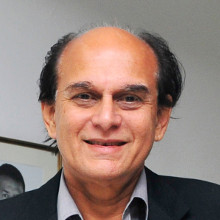[Photograph by Luis Wilker Perelo under Creative Commons]
Like many entrepreneurs, most of my wealth is in companies I founded, in the form of Marico and Kaya stock. What this does is demonstrate commitment to other stakeholders. However, to diversify our assets and not put all our eggs in one basket, my son Rishabh urged that we establish a family office.
So we set it up a year ago and it now operates under the name Sharrp Ventures. Like many businesses and families, over time, our liquid assets grew to a point where it was evident we needed a systematic, organized framework under which to invest. After all, just as a strategic plan provides a compass for an operating business, it is necessary to have one for personal assets.
The truth is, ideas and investment opportunities are a dime a dozen. But without a plan, you end up operating in a reactive manner. Instead, I would much rather take a considered view of opportunities that come our way and their alignment with our long-term objectives.
Sure, the idea of family offices is new to India. But in more developed markets like the US and Europe, it has been around for as long as a 100 years. There are an estimated 4,500 family offices across these continents and they manage assets in the region of $2 trillion.
But family offices need not be the preserve of business owners or extremely wealthy families. With stock options becoming a norm, as well as supra normal bonuses, higher salaries and double incomes, the assets of some professionals warrant a more structured approach only a family office can provide.
I must add here, as family separations, sale of businesses, and generational change accelerate, the need for a systematic approach to manage attendant issues like passing on and managing wealth are only going to increase. So a family office adapted to the environment in India can be a very useful and viable tool that takes a proactive approach to address these issues.
A family office can serve many functions. These include investment management, succession planning, wealth transfer, social responsibility initiatives, family governance, generational education and planning, mentoring, risk management, the formalities that go with taxation, legal and administrative services, etc. But there is no one-size-fits-all approach. It needs to be tailored to the needs of each family and the circumstances they live under.
Why? Because within a family, the needs of a newborn are very different from that of an octogenarian, for instance. Identifying the needs and establishing a plan for each family member usually requires time, thought and the involvement of other members in the family.
Once the key requirements are identified, the question arises as to whether to establish an in-house single-family office, or to work within the construct of a multi-family office. The former may make sense where the size of assets are sufficient not just to attract, but also to retain talented professionals and ensure access to the best investment opportunities.
A multi-family office on the other hand allows all of this by pooling assets and sharing costs. If there is a family member who has the training, aptitude, time and willingness to manage the office, that could help mitigate the scale issue that comes with a single-family office.
That said, I believe not all functions ought to be performed by the family office. For instance, external advisors generally provide specialized tax and legal advice. Much the same thing can be said about succession planning and family governance. Instead, the family office should serve as a centralized hub to co-ordinate activities even as it provides a holistic view to individual issues.
In my family’s case, our primary objective is investment management. That is why we chose a hybrid approach. Under this approach, Sharrp Ventures retains control over the overall investment decisions. But we have the benefits of a specialized advisor who provides the advantages of scale given their work across other families. My son and I have limited time to be able to screen every investment opportunity that comes our way. Having a professional advisor do that in a systematic way makes the process far more efficient and effective.
If you decide to work with an advisor, it is important their incentives be aligned with yours. Too often people are penny-wise and pound-foolish, as they refuse to pay advisory fees. The consequences can be disastrous. Under the guise of “advice” they are often “sold” products that may not be in their best interest, but on which the “advisor” earns a healthy commission or asset management fee. This is something I don’t understand.
Why would anybody not prefer the transparency and objectivity of a fee-only model where the advisor is incentivized to recommend the best investments? It is better to pay somebody to manage my money than lose that money. Investments are not my core business. I need to know what to do with a stock if things go wrong with it and how to exit from it.
That is why when Rishabh and I were thinking of setting up a family office, we interviewed three advisors, gauged our comfort levels with them, did reference checks and zeroed in on whom we wanted to work with.
The other option was to work with a private bank. However, I prefer working directly with specific individuals. Individual advisors who own their businesses will stay with me in the long run. At a private bank the person handling my funds could change. This may have led to my disappointing a lot of people at banks and non-banking financial companies (NBFCs) that offer such services. But I told myself that is okay. On occasion, it is entirely possible that some of their objectives may conflict with my investment preferences and I wanted to avoid that.
One of the first things we did under the umbrella of our family office was to take an inventory of all our assets. Besides providing a holistic, unified view across asset classes (e.g. equity, real estate, debt, etc.), it forced us to take an objective view of each asset and assess which made sense to retain. As a result of this exercise, we sold some assets and re-deployed the funds to optimize returns.
While our primary objective is financial returns, on occasion through start-ups we also get visibility into new business models, technologies and developments in consumer behaviour. The point is to be clear about one’s objectives before making an investment.
Once the objective is clear, it helps to create a framework around which we can make disciplined investments. It leaves no room for distractions. For instance, between Rishabh and I, we told ourselves, 15 to 20% of our investments ought to go into non-capital market businesses.
It fits in with my stated philosophy of placing high-risk investments. So I don’t like investing in debt funds, real estate or precious metals. I look at the long term. That could be anywhere between five and 10 years. That is also why I don’t evaluate my assets every month. What I like is a detailed review every six months to see if things are on track.
The key brief to our family advisor is to invest in some seed, venture and private equity funds, as well as co-investments with funds. We make some direct investments as well on the back of advice from investors we know and whose judgement we trust. What gives me the confidence to do that is that they do detailed homework and are investing monies from their own fund. But the investments on my part here are small. Inevitably, the deal comes to us through them. They do all of the due diligence and if we like it as well, we invest. I like to make such investments because we go through a lot of learning.
I have seen some family offices being involved in legal matters as well, like the family will for instance. When it comes to a large family, the family office can also manage the process of establishing a constitution for the family—or a code of conduct if you will. This may cover lifestyle living, image building of a family member, and the entry or exit of a member from the family business.
Then there is charity. Oftentimes, this mandate too is given to the family office. My family office is focused on investments and wealth management. Charity is an issue that must be dealt with separately and I like it that way.

